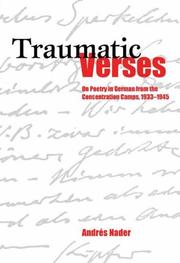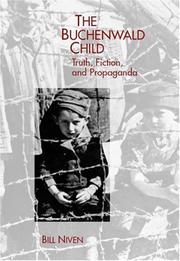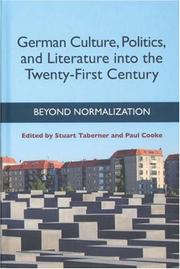| Listing 1 - 8 of 8 |
Sort by
|
Book
ISBN: 1782045066 1322566658 1782044191 1571139052 Year: 2014 Publisher: Rochester, New York : Camden House,
Abstract | Keywords | Export | Availability | Bookmark
 Loading...
Loading...Choose an application
- Reference Manager
- EndNote
- RefWorks (Direct export to RefWorks)
How has the German image of the Nazi past changed since the reunification of East and West Germany? And what role have cinema and television played in this process? This intriguing study argues that since 1990, the two media haveturned toward inner German experiences of the Third Reich. From intimate portrayals of ordinary Germans and Nazi leaders to immersive spectacles of war and defeat, German film has focused on portraying the Nazi past from within. Stimulating and accessible, combining close readings with broad contextualization, this monograph shows how profoundly cinema and television have transformed collective remembrance of the Third Reich. The first publication on the topic to embrace the two decades since 1990, it provides a comprehensive account of cinema and television productions, presenting case studies of national film events such as Stalingrad (1993) and Downfall (2004), andassessing the influence of international blockbusters from Schindler's List (1993) to The Reader (2008). Targeted at a wide readership, the book will be a central reference point for university teachers offering courses on German film or cultural memory, will give guidance to both undergraduate and postgraduate students, and will make a lasting impact on research in the field of German screen cultures. Axel Bangert holds a doctorate from the Faculty of Modern and Medieval Languages, University of Cambridge. Previously a Junior Research Fellow at Homerton College, Cambridge, he is an Adjunct Professor at New York University Berlin where he teaches German Cinema Studies.
National socialism and motion pictures. --- National socialism in motion pictures. --- Nazis in motion pictures. --- Motion pictures --- History --- German film. --- Nazi past. --- Schindler's List. --- The Reader. --- Third Reich. --- cinema. --- collective remembrance. --- cultural memory. --- defeat. --- inner German experiences. --- reunification. --- television. --- war.
Book
ISBN: 1282946927 9786612946929 1571137890 1571133682 Year: 2008 Publisher: Rochester, N.Y. : Camden House,
Abstract | Keywords | Export | Availability | Bookmark
 Loading...
Loading...Choose an application
- Reference Manager
- EndNote
- RefWorks (Direct export to RefWorks)
The German novelist Martin Walser's 1998 speech upon accepting the Peace Prize of the German Book Trade remains a milestone in recent German efforts to come to terms with the Nazi past. The day after the speech, Ignatz Bubis, leader of Germany's Jewish community, attacked Walser for inciting dangerous right-wing sentiment with controversial passages including the notorious statement 'Auschwitz is not suited to be a moral bludgeon,' thus igniting the protracted public battle of opinions known as the 'Walser-Bubis Debate.' The speech continues to loom large in Germany's struggle to acknowledge responsibility for Nazi crimes yet escape a suffocating burden of remembrance. But in spite of its notoriety, little attention has been paid to what the speech actually says, as opposed to the public outcry and debate that followed it. This book presents the text of the speech, along with several of Walser's other essays and speeches about the Holocaust and its impact on German identity, in English translation. It examines them as texts, a process that involves a discussion of literary complexities and an attempt to distinguish valid criticism of German intellectual life from what is justifiably problematic. And it places this textual examination in the context of Walser's and other postwar German intellectuals' attempts to deal with the Nazi past, of German-Jewish relations in the postwar era, and of the once hidden and now - due in part to Walser's speech - increasingly open discourse about Germans as victims during and immediately after the Nazi era. Thomas A. Kovach is professor of German Studies at the University of Arizona.
Walser, Martin, --- Political and social views. --- Germany --- Third Reich, 1933-1945 --- History. --- History --- Electronic books. -- local. --- Germany -- History -- 1933-1945. --- Germany -- History. --- Walser, Martin, -- 1927- -- Political and social views. --- LITERARY CRITICISM / European / German. --- German-Jewish Relations. --- Germans as Victims. --- Martin Walser. --- Nazi Past. --- Peace Prize Speech. --- 1927 --- -Political and social views.
Book
ISBN: 1787446735 9781787446731 9781640140455 164014045X Year: 2020 Publisher: Rochester, New York Camden House
Abstract | Keywords | Export | Availability | Bookmark
 Loading...
Loading...Choose an application
- Reference Manager
- EndNote
- RefWorks (Direct export to RefWorks)
With the disappearance of the eyewitness generation and the globalization of Holocaust memory, this book interrogates key concepts in Holocaust and trauma studies through an assessment of contemporary German-language Jewish authors.
German literature --- Holocaust, Jewish (1939-1945), in literature. --- Jewish authors --- History and criticism. --- Aesthetics. --- Benjamin Stein. --- Contemporary German-Language Jewish Literature. --- Cultural Studies. --- Ethics. --- Eva Menasse. --- Eyewitness Generation. --- Globalization. --- Holocaust Representation. --- Holocaust. --- Hyper-Mediation. --- Literary Studies. --- Maxim Biller. --- Media. --- Memory. --- Nazi Past. --- Renegotiating Postmemory. --- Transgenerational Memory. --- Transnational Memory. --- Vladmir Vertlib.

ISBN: 1571133755 9781571133755 9781571137067 9781571134806 1571134808 9786612150609 128215060X 1571137068 Year: 2007 Publisher: Rochester Camden house
Abstract | Keywords | Export | Availability | Bookmark
 Loading...
Loading...Choose an application
- Reference Manager
- EndNote
- RefWorks (Direct export to RefWorks)
Auschwitz, Buchenwald, Christianstadt, Dachau. The names of Nazi concentration camps evoke images of radical destitution. The atrocities we call the Holocaust defy comprehension, while thinkers continue to ponder the possibility of 'poetry after Auschwitz.' And yet a number of people composed poems while imprisoned in the camps. Unlike most documents about the camps, these poems are self-representations that convey the perspective of the inmates who wrote them. 'Traumatic Verses' provides psychoanalytically informed close readings of a range of poems and discusses their significance for aesthetic theory and for research on the camps. It also tells the stories behind the composition and preservation of these poems and the history of their publication since 1945. Most of the poems appear here for the first time in English translation along with the original texts. This book fills a gap left by literary historians, who have mostly ignored writings from the camps and avoided careful scrutiny of literature produced under the Nazi regime. Studies of trauma have concentrated on post-traumatic experiences; discussions of aesthetics 'after' the Holocaust have neglected the issue of the artistic impulse 'in' the camps. On both counts this book constitutes a unique contribution to scholarship, showing that, when read attentively, the poems written in the camps are invaluable sites for confronting the Nazi past. Andrés J. Nader is Project Manager at the Amadeu Antonio Foundation in Berlin, and lectures at the Humboldt University. Winner, 2008 Modern Language Association Book Prize for Independent Scholars; from the statement of the Selection Committee: Leading a new generation of students of the Holocaust, Nader persuasively analyzes the psychological needs and motivations behind ... poetry composed in the concentration camps. Displaying a strong command of trauma and pain theory, as well as the prior history of Holocaust studies, [Nader] illuminates the role of poetry in the camp inmates' reclamation of the German language and cultural heritage. Offering many poems in English for the first time, in elegant translation, Nader's anthology and commentary add a significant new dimension to Holocaust studies.
Concentration camp inmates' writings --- German poetry --- Holocaust, Jewish (1939-1945) in literature --- World War, 1939-1945 --- World War, 1939-1945, in literature --- Writings of concentration camp inmates --- Literature --- History and criticism --- Literature and the war --- Nazi concentration camp inmates' writings --- Holocaust, Jewish (1939-1945), in literature. --- History and criticism. --- Literature and the war. --- Writings of Nazi concentration inmates --- Aesthetic theory. --- Andrés J. Nader. --- Close readings. --- Concentration camps. --- Holocaust. --- Inmates. --- Nazi past. --- Poetry. --- Psychoanalytically.
Book
ISBN: 1789200334 Year: 2019 Publisher: New York ; Oxford : Berghahn,
Abstract | Keywords | Export | Availability | Bookmark
 Loading...
Loading...Choose an application
- Reference Manager
- EndNote
- RefWorks (Direct export to RefWorks)
"For many centuries, Germany has enjoyed a reputation as the 'land of music'. But just how was this reputation established and transformed over time, and to what extent was it produced within or outside of Germany? Through case studies that range from Bruckner to the Beatles and from symphonies to dance-club music, this volume looks at how German musicians and their audiences responded to the most significant developments of the twentieth century, including mass media, technological advances, fascism, and war on an unprecedented scale"--
Music --- National characteristics, German. --- Social aspects --- History --- History and criticism. --- German influences. --- bavaria. --- berlin. --- case studies. --- dance. --- engaging. --- europe. --- fascism. --- female musicians. --- german concert halls. --- german culture. --- german democratic republic. --- german music scene. --- german music. --- german musicians. --- german society. --- germany. --- hamburg. --- historical. --- history. --- identity. --- jewish music. --- land of music. --- live arts. --- mass media. --- modern german history. --- munich national theater. --- munich. --- musicology. --- mythology. --- nazi past. --- performing arts. --- politics. --- postwar germany. --- rock and roll. --- technological advances. --- theater. --- theatrical productions. --- wagnerism. --- war.
Book
ISBN: 9781571135803 9781571134011 1571135804 1571134018 9781571137548 9786612795572 1571137548 1282795570 Year: 2009 Publisher: Rochester, N.Y. : Camden House,
Abstract | Keywords | Export | Availability | Bookmark
 Loading...
Loading...Choose an application
- Reference Manager
- EndNote
- RefWorks (Direct export to RefWorks)
George Orwell said that all writing is political; but the writers of some nations and some periods are more political than others. German writers after 1945 have exemplified such heightened politicization, and this book considers their contribution to the democratic development of Germany by looking principally at their directly political, non-fictional writings. It pays particular attention to writers and the student movement of the 1960s and '70s, when some proclaimed the death of literature and called for a turn to direct political action. Yet writers in both parts of Germany gradually came to identify with their respective states, even if the idea of one Germany never entirely disappeared. The unification of 1989-1990, in which this idea astonishingly became reality, posed a major (and some would say unmet) challenge to writers in both East and West. After looking at this period of intense political activities, the book considers the continuing East/West division and changing attitudes to the Nazi past, asking whether the intellectual climate has swung to the right. It also asks to what extent political involvement has been a generational project for the immediate postwar generation and is less important for younger writers who see the Federal Republic as a 'normal' democratic state. Stuart Parkes is Emeritus Professor of German from the University of Sunderland (UK).
Authors, German --- Politics and literature --- German literature --- Ecrivains allemands --- Politique et littérature --- Littérature allemande --- Political activity. --- Political activity --- History --- History and criticism. --- History and criticism --- Activité politique --- Histoire --- Histoire et critique --- Politique et litterature --- Litterature allemande --- Political and social views. --- Activite politique --- Pensee politique et sociale --- Politique et littérature --- Littérature allemande --- Activité politique --- Germany --- Politics and government. --- German authors --- Democratic State. --- East Germany. --- Generational Change. --- German Writers. --- Germany. --- Literature. --- Nazi Past. --- Political Action. --- Political Writing. --- Student Movement. --- Unification. --- West Germany. --- Writers and Politics.

ISBN: 1571136940 1571133399 1571134042 Year: 2023 Publisher: Rochester, New York : Camden House,
Abstract | Keywords | Export | Availability | Bookmark
 Loading...
Loading...Choose an application
- Reference Manager
- EndNote
- RefWorks (Direct export to RefWorks)
'The Buchenwald Child' examines the story of a Jewish child's rescue at Buchenwald and its use as propaganda in both East and united Germany.
World War, 1939-1945 --- Anti-fascist movements --- Collective memory --- Concentration camps --- Liberation --- Zweig, Stefan Jerzy, --- Apitz, Bruno. --- Imprisonment. --- Buchenwald (Concentration camp) --- Collective remembrance --- Common memory --- Cultural memory --- Emblematic memory --- Historical memory --- National memory --- Public memory --- Social memory --- Memory --- Social psychology --- Group identity --- National characteristics --- Anti-fascist resistance --- Underground, Anti-fascist --- Fascism --- European War, 1939-1945 --- Second World War, 1939-1945 --- World War 2, 1939-1945 --- World War II, 1939-1945 --- World War Two, 1939-1945 --- WW II (World War, 1939-1945) --- WWII (World War, 1939-1945) --- History, Modern --- Concentration Camp Buchenwald --- CC Buchenwald --- KL Buchenwald --- Konzentrationslager Buchenwald --- KZ Buchenwald --- Sowjetisches Speziallager Nr. 2 --- Antifascist movements --- Social movements --- Buchenwald Concentration Camp. --- Communist Prisoners. --- East Germany. --- German Democratic Republic. --- Jewish Child. --- Nazi Past. --- Nazi Resistance. --- Propaganda. --- Stefan Zweig. --- Uprising.

ISBN: 1571133380 157113512X 9786611949372 1571136789 128194937X Year: 2006 Publisher: New York Camden house
Abstract | Keywords | Export | Availability | Bookmark
 Loading...
Loading...Choose an application
- Reference Manager
- EndNote
- RefWorks (Direct export to RefWorks)
This volume features sixteen thought-provoking essays by renowned international experts on German society, culture, and politics that, together, provide a comprehensive study of Germany's postunification process of 'normalization.' Essays ranging across a variety of disciplines including politics, foreign policy, economics, literature, architecture, and film examine how since 1990 the often contested concept of normalization has become crucial to Germany's self-understanding. Despite the apparent emergence of a 'new' Germany, the essays demonstrate that normalization is still in question, and that perennial concerns - notably the Nazi past and the legacy of the GDR - remain central to political and cultural discourses and affect the country's efforts to deal with the new challenges of globalization and the instability and polarization it brings. This is the first major study in English or German of the impact of the normalization debate across the range of cultural, political, economic, intellectual, and historical discourses. CONTRIBUTORS: STEPHEN BROCKMANN, JEREMY LEAMAN, SEBASTIAN HARNISCH AND KERRY LONGHURST, LOTHAR PROBST, SIMON WARD, ANNA SAUNDERS, ANNETTE SEIDEL ARPACI, CHRIS HOMEWOOD, ANDREW PLOWMAN, HELMUT SCHMITZ, KAROLINE VON OPPEN, WILLIAM COLLINS DONAHUE, KATHRIN SCHöDEL, STUART TABERNER, PAUL COOKE. Stuart Taberner is Professor of Contemporary German Literature, Culture, and Society and Paul Cooke is Senior Lecturer in German Studies, both at the University of Leeds.
German literature --- Politics and literature --- History and criticism --- Germany --- Weimar Republic --- Germanii︠a︡ --- Германия --- BRD --- FRN --- Jirmānīya --- جرمانيا --- Nimechchyna --- Gjermani --- Federalʹna Respublika Nimechchyny --- Veĭmarskai︠a︡ Respublika --- Ashkenaz --- Germanyah --- Bundesrepublik Deutschland --- Federal Republic of Germany --- Deutschland --- Repoblika Federalin'i Alemana --- República Federal de Alemania --- Alemania --- República de Alemania --- Bu̇gd Naĭramdakh German Uls --- Kholboony Bu̇gd Naĭramdakh German Uls --- KhBNGU --- ХБНГУ --- German Uls --- Germania --- Republika Federal Alemmana --- Deutsches Reich --- Grossdeutsches Reich --- Weimarer Republik --- Vācijā --- Germany (Territory under Allied occupation, 1945-1955) --- Germany (Territory under Allied occupation, 1945-1955 : British Zone) --- Germany (Territory under Allied occupation, 1945-1955 : French Zone) --- Germany (Territory under Allied occupation, 1945-1955 : Russian Zone) --- Germany (Territory under Allied occupation, 1945-1955 : U.S. Zone) --- Germany (East) --- Germany (West) --- Holy Roman Empire --- Civilization --- Intellectual life --- ドイツ --- Doitsu --- ドイツ連邦共和国 --- Doitsu Renpō Kyōwakoku --- History and criticism. --- ドイツ レンポウ キョウワコク --- Deguo --- 德国 --- Gėrman --- Герман Улс --- Contemporary. --- Cultural. --- Discourses. --- Economic. --- Germany. --- Historical. --- Intellectual. --- Legacy. --- Nazi past. --- Normalization. --- Political.
| Listing 1 - 8 of 8 |
Sort by
|

 Search
Search Feedback
Feedback About UniCat
About UniCat  Help
Help News
News